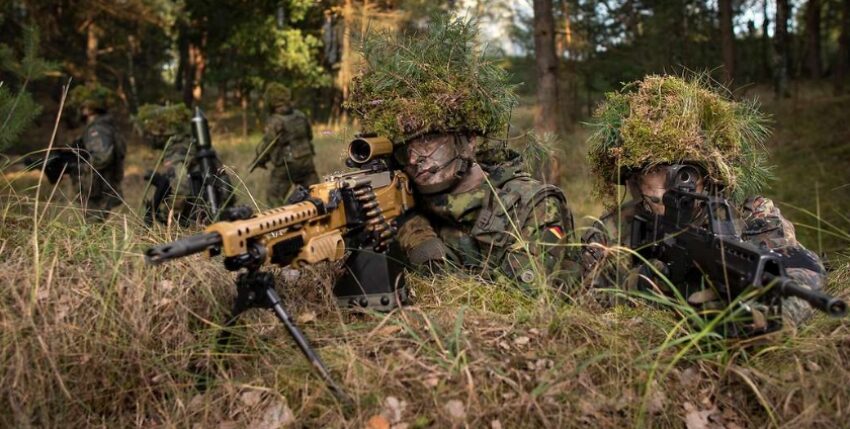Russia is continuing its war of aggression against Ukraine unabated, while trust in its ally, the USA, is dwindling. How is the German population reacting to this dual challenge? The annual population survey conducted by the Bundeswehr Centre for Military History and Social Sciences (ZMSBw) provides answers to questions on threat perception, transatlantic relations and the willingness to defend Germany. Over 2,000 randomly selected citizens took part in the representative survey between 11 April and 17 May 2025.
Majority sees Russia as a threat

Two thirds of the population perceive Russia as a threat to Germany's security. Fear of Russian cyber attacks and the armament of the Russian armed forces has increased. This sense of threat is similarly pronounced in all groups of the German population: even respondents with a voting preference for the AfD or the Left see Russia as a threat in the majority of cases. The tensions between the West and Russia now represent the second biggest threat to their personal security from the perspective of respondents - after inflation, but even before immigration to Germany.
Trust in the USA as an ally is waning
Since Donald Trump's re-election as US President, the German population's previously high level of trust in the USA as a reliable (alliance) partner has fallen sharply by 21 percentage points compared to 2024 to 41 per cent. Only 37 per cent of respondents still see the USA as a reliable partner in principle. This represents a loss of 28 percentage points and the biggest change in attitude compared to the previous year. A relative majority perceive US foreign and security policy as a threat to cohesion within NATO. Although trust in the USA as a NATO partner is currently suffering, a majority of citizens do not want to do without the military support of the USA.

German Armed Forces/Leon Rodewald
Growing support for defence capabilities
In this threat situation, the financial and personnel strengthening of the Bundeswehr is meeting with ever greater approval: never before have more citizens spoken out in favour of an increase in defence spending (64%; +7 percentage points compared to 2024) and an increase in the number of Bundeswehr personnel (65%; +7 percentage points). A majority of all groups surveyed are in favour of strengthening the Bundeswehr. Only a small minority are in favour of reducing defence spending (8 percent) and the number of Bundeswehr personnel (7 percent), while a quarter (24 percent; -6 percentage points) are in favour of maintaining the same level. An unchanged large majority of society of more than 80 per cent has a positive attitude towards the Bundeswehr, has confidence in it and rates the relationship between the Bundeswehr and society positively. "Strengthening the Bundeswehr and national defence capability is the consensus of society as a whole," says Dr Timo Graf, head of the population survey.
The introduction of a new military service for young people also meets with majority approval among the population. Compared to the previous year, acceptance has also increased among 16-29 year olds and a relative majority in this group now consider the introduction to be necessary. A large proportion of the population under the age of 50 would also say that they would be prepared to defend the country with a weapon in the event of a military attack: Among men, the figure for personal willingness to defend themselves is 54 per cent, compared to 21 per cent of women. This clearly shows that "citizens are not only calling for the Bundeswehr to be strengthened by increasing defence spending, but would also be prepared to get personally involved in the military," says Dr Graf.

NATO and the EU more important than ever
Despite the massive loss of trust in the alliance partner USA, the majority of respondents are clearly committed to NATO alliance defence. Compared to the previous year, approval of NATO alliance defence has risen further, particularly with regard to Germany's leading military role. Opinion on EU defence cooperation, which has been positive for many years, has also improved significantly once again. An absolute majority of respondents are in favour of a common European security and defence policy, financial support for European armaments projects, the EU acting as an independent security and defence policy actor and a common European army. Public approval of a leading military role for Germany in the EU has also increased significantly (44 per cent; +7 percentage points; disapproval: 27 per cent; partly/somewhat: 26 per cent).
Conclusion
Public support in Germany for an ambitious German defence policy and Germany's leading military role in NATO and the EU has increased compared to the previous year and is stronger than ever. The majority of citizens feel militarily threatened by Russia and many have lost confidence in the USA as a reliable NATO ally since President Trump took office - but not confidence in NATO and its European partners. In the view of a large majority of the German population, this dual challenge to the security of Europe and Germany should be countered by strengthening the country's own defence capabilities in two ways: firstly, by strengthening the Bundeswehr financially and in terms of personnel, and secondly, through even stronger defence cooperation within NATO and the EU.
Author: Dr Timo Graf heads the annual ZMSBw population survey and is the author of the research report.
Study: The annual ZMSBw population survey has been the benchmark for the social legitimisation, relevance and integration of the armed forces since the survey study began in 1996.







